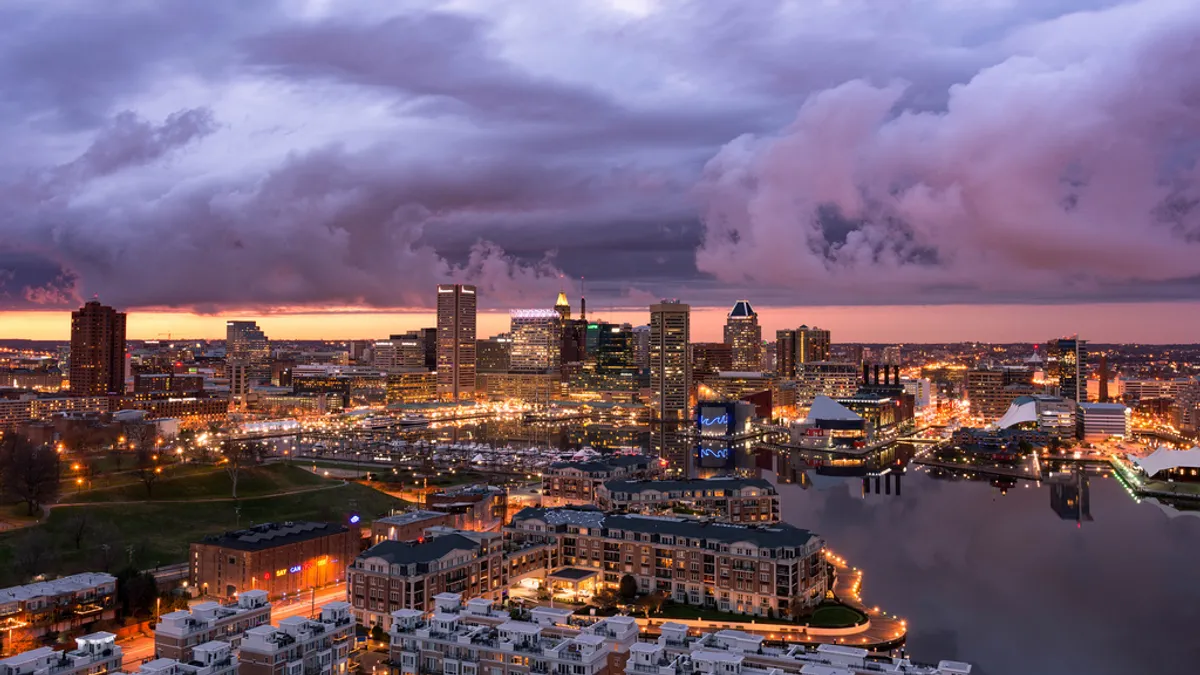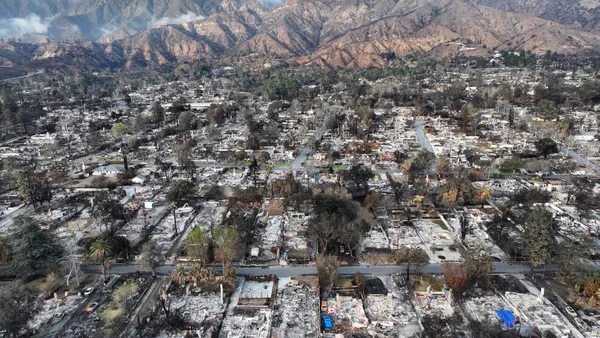UPDATED, Feb. 5, 2021: The City of Baltimore’s spending board unanimously decided Wednesday to end the city’s aerial surveillance program, the Baltimore Sun reports.
The controversial six-month pilot program, used by the police department, deployed a number of privately-owned airplanes to capture overhead images across 32 square miles of the city, in an attempt to help reduce crime. The program was narrowly approved last spring by the Board of Estimates, but received vocal opposition from privacy advocates and now-Mayor Brandon Scott.
The board's decision to end the program comes as the city faces a lawsuit filed by the American Civil Liberties Union (ACLU) over the planes' use. Acting city solicitor Jim Shea said the legal dispute is "moot" with the contract terminated, the Sun reports.
Dive Brief:
- Three surveillance planes received approval to begin flying over Baltimore this week as part of a controversial six-month pilot, following a 3-2 vote from the city's Board of Estimates, the Baltimore Sun reports.
- The privately funded airplanes will gather images of the city to help with the investigations of murders, shootings, armed robbery and carjackings. The images won’t be used in real-time, but instead as a type of historical record.
- The approval arrives at a time when most of the city is in lockdown, following Gov. Larry Hogan's "stay at home" order delivered this week to slow the spread of COIVD-19. The airplane footage won't be used to help enforce those orders, experts say, but the coronavirus has disrupted community engagement efforts to inform residents about the airplanes, City Council President Brandon M. Scott told Smart Cities Dive.
Dive Insight:
The airplanes originally flew over the city in secret in 2016 without public input. This time was supposed to be different, said Scott, who was was disappointed the airplanes were approved during a worldwide public health crisis.
He said there should have been "robust community engagement and involvement," but COVID-19 has prevented much of that as the city is no longer able to conduct community meetings in-person. Two public meetings about the airplanes have been hosted over Facebook, one of which drew more than 7,000 viewers, the Baltimore Sun reports. But Scott said some of the residents who will be most affected by the airplanes don’t have the internet access to participate in such events.
"We don’t have time to be anyone's guinea pigs," he said. "We should be laser focused on technology that we know works."
Last year, a local faith leader and member of the Greater Baltimore Committee's board of directors commissioned a poll to 500 residents that revealed 74% of respondents would support the surveillance planes to help stifle crime, the Sun reported. The city's police commissioner Michael Harrison and Mayor Bernard Young have also come out in favor of the airplanes.
There have already been 72 homicides in Baltimore this year, including 21 homicides over the past 30 days since much of the COVID-19 isolation orders have been put in place. There have been over 300 homicides in the city annually since 2015, according to the Baltimore Sun's homicide tracker.
"It’s an unacceptable level of violence," Ted Walsh, a vocal supporter of the planes budget analyst for Maryland's Department of Budget and Management who did not speak on behalf of the department, told Smart Cities Dive. The city is on pace for another deadly year, he said.
One point of discussion about the planes that's often overlooked, according to Walsh, is how broadly surveillance has already entered daily life.
"We’ve already hit a point where if you are outside, people expect that they are being filmed by something," he said. "Having a tool that the police can use that doesn’t really add any additional surveillance, it just gives them the option to do it, isn’t really a horrible infringement on our rights because nobody expects privacy outside anymore."
The issue of privacy does have critics like the American Civil Liberties Union (ACLU) raising alarm bells, however. The proposed program is an "Orwellian nightmare come to life," ACLU of Maryland Senior Staff Attorney David Rocah told Smart Cities Dive in an earlier interview.
To keep up with all of our coverage on how the new coronavirus is impacting U.S. cities, visit our daily tracker.












